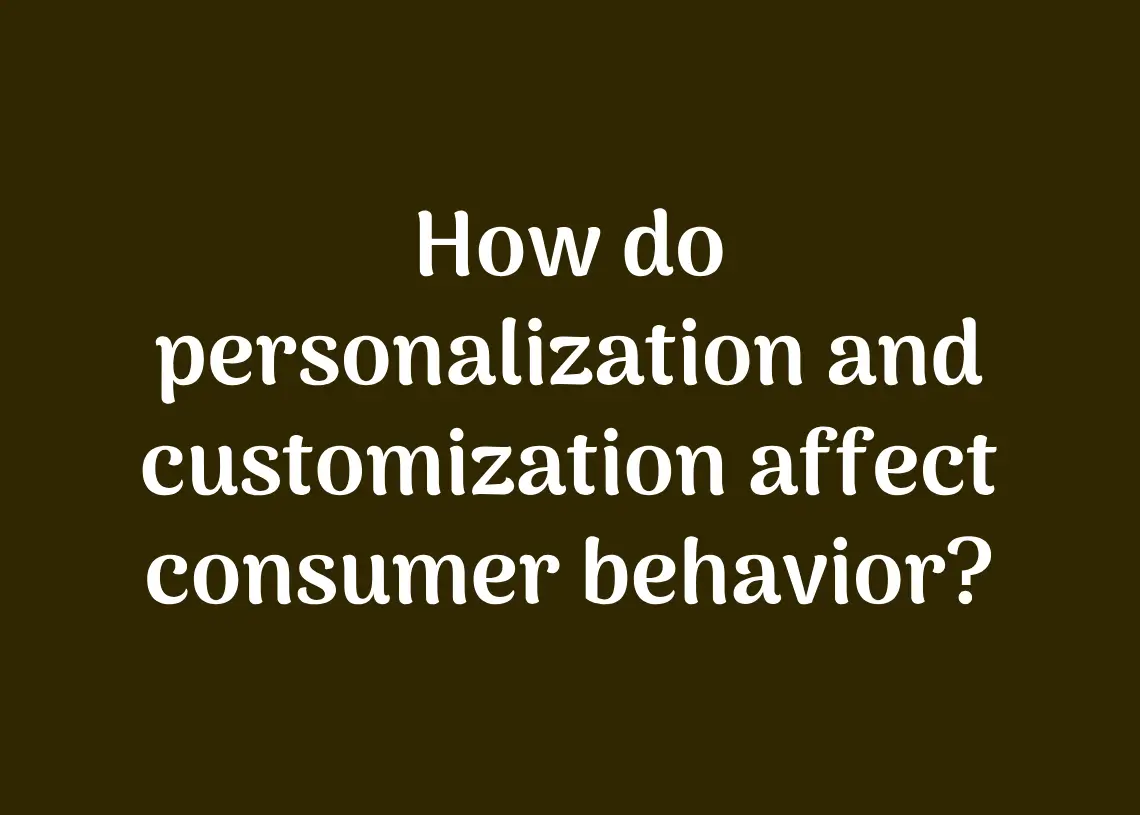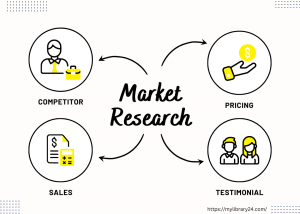In today’s competitive market, businesses are constantly seeking ways to differentiate themselves from their competitors and attract and retain customers. One approach that has gained significant traction in recent years is personalization and customization.
Personalization involves tailoring products or services to meet the unique needs, preferences, and behaviors of individual customers, while customization involves allowing customers to configure or design products to their specific requirements. But how do these two strategies impact consumer behavior?
Research has shown that personalization and customization can have a significant impact on consumer behavior. When customers feel that products or services are tailored to their specific needs, they are more likely to make a purchase.
Similarly, when customers have the option to customize products, they are more likely to feel a sense of ownership and invest more in the product. Furthermore, personalization and customization can improve customer satisfaction and loyalty, which can lead to repeat business and positive word-of-mouth referrals.
Earn a certificate in your dream career for an affordable price at IAP Career College today!
Understanding consumer preferences through data.
Understanding consumer preferences through data is an essential component of personalization and customization strategies. The collection and analysis of consumer data can provide valuable insights into their behaviors, preferences, and needs.
This information can help companies create tailored experiences that meet the individual needs of customers, increase customer satisfaction, and ultimately drive revenue. Data can be obtained from various sources, such as social media, website analytics, and customer surveys.
Analyzing this data can reveal patterns and trends that can be used to develop personalized marketing campaigns, product recommendations, and customer service interactions. By using data to understand consumer preferences, companies can create more meaningful and relevant experiences that drive customer loyalty and repeat business.
Customization makes consumers feel valued.
Customization is one of the most efficient ways to make consumers feel valued and appreciated. It allows consumers to tailor products and services to their unique needs and preferences, creating a personalized experience that resonates with them.
By offering personalized options, companies can show their customers that they care about their individual needs and interests. This can lead to increased customer loyalty, as well as a stronger brand image. Consumers are more likely to engage with brands that offer customized products and services, as they feel like they have a say in the purchasing process.
In today’s market, where consumers are bombarded with multiple choices, customization is a valuable tool for companies to differentiate themselves and stand out amongst their competitors.
Personalization leads to higher engagement.
When it comes to marketing and consumer behavior, personalization can be a game-changer. Research shows that personalization leads to higher engagement and better overall customer experiences. Personalization can take many forms, from targeted emails and customized product recommendations to personalized website content and tailored social media ads.
By collecting data on consumer preferences, browsing behavior, and purchase history, companies can create personalized experiences that resonate with consumers on a deeper level. This not only increases engagement but can also lead to higher conversion rates and customer loyalty.
Additionally, personalization can help companies stand out in a crowded marketplace, demonstrating a commitment to understanding and meeting the unique needs of their customers. Overall, personalization is an essential component of modern marketing strategies and can have a significant impact on consumer behavior.
Increased conversions with personalized content.
Personalization and customization have become buzzwords in the world of marketing, and for good reason. When it comes to increasing conversions, personalized content is a powerful tool. By tailoring content to the individual consumer’s interests, preferences, and behaviors, companies can create a more engaging and relevant experience that resonates with their target audience.
Personalized content can include anything from emails that address the recipient by name, to product recommendations based on past purchases or browsing history. This type of customized content not only increases the chances of a purchase, but it also fosters consumer loyalty and brand advocacy. In fact, studies have shown that personalized content can lead to an increase in conversions by up to 20%.
Overall, personalization is a highly effective strategy for businesses looking to improve their conversion rates and build long-lasting relationships with their customers.
Customization increases customer satisfaction.
Customization increases customer satisfaction, giving them a sense of ownership and control over their purchases. Customers appreciate having the ability to tailor their products to their specific preferences, leading to increased loyalty and repeat business.
Personalization and customization can be achieved through various means, such as product design, packaging, and marketing messaging. Additionally, customization allows companies to differentiate themselves from competitors and stand out in a crowded marketplace.
By understanding the specific needs and wants of their customers, businesses can create tailored experiences that enhance customer satisfaction and drive sales. As such, it is crucial for companies to invest in personalization and customization strategies in order to better serve their customers and remain competitive in the marketplace.
Personalization boosts brand loyalty.
Personalization has become an essential strategy for businesses looking to boost brand loyalty. By providing customized experiences to each individual customer, businesses can create a stronger emotional connection with their consumers.
This emotional connection results in higher levels of customer satisfaction and loyalty, which can lead to increased sales and revenue. Personalization also allows businesses to better target their marketing efforts, as they can tailor their messaging and offers to specific customers based on their interests and behaviors. Overall, personalization has the potential to significantly impact consumer behavior and can be a powerful tool for businesses looking to build stronger relationships with their customers.
Customization improves customer retention.
In today’s competitive market, customer retention is more important than ever. One effective way to improve customer retention is through customization. Customization allows customers to feel that their preferences and needs are being met, which can lead to increased loyalty towards a brand.
In fact, research has shown that 80% of consumers are more likely to do business with a company that offers personalized experiences. Customization can take many forms, such as personalized recommendations, tailored products or services, or even personalized marketing messages.
By offering a personalized experience, brands can create a deeper connection with their customers, which can ultimately lead to increased sales and customer loyalty.
Personalized recommendations increase sales.
Personalized recommendations have become increasingly important for businesses to enhance their sales and improve customer experience. In fact, research has shown that personalized recommendations are highly effective in boosting sales.
By providing personalized recommendations, businesses can show customers that they understand their preferences and needs. This can increase the likelihood of customers making a purchase and can also encourage repeat business. Personalized recommendations are particularly useful for online businesses, where customers are often overwhelmed with choices.
By providing personalized recommendations, businesses can help customers navigate through the vast options available and find products that are relevant to their interests. Overall, personalized recommendations are a powerful tool for businesses to improve customer engagement and increase sales.
Customization can be costly.
Customization can be a powerful tool for businesses looking to attract and retain customers, but it’s important to remember that it can also be costly. Personalization and customization require additional resources, including employee time and specialized technology, which can add to a company’s bottom line.
For some businesses, the cost of customization may outweigh the benefits, particularly if they are working with a small budget. It’s essential to carefully evaluate the costs and benefits of customization before investing in it to ensure that it aligns with business goals and will provide a positive return on investment.
At the same time, it’s important to recognize that customization can be a key differentiator in today’s competitive market, and businesses that are able to offer personalized products or services may have an edge over their competitors.
Personalization requires data privacy.
In today’s digital age, personalization has become a key factor in shaping consumer behavior. Brands are increasingly leveraging data and technologies to offer personalized experiences that cater to the unique needs and preferences of individual consumers.
However, this trend also raises concerns around data privacy. Personalization requires brands to collect and process consumer data, which can include sensitive information such as browsing history, purchase behavior, and location. Consumers are becoming more aware of their data privacy rights and are demanding greater transparency and control over how their data is collected and used.
Brands that prioritize data privacy and demonstrate a commitment to protecting consumer information are more likely to earn consumer trust and loyalty. It’s important for brands to strike a balance between personalization and data privacy to create meaningful, relevant experiences that resonate with consumers while maintaining their trust.
Conclusion: How do personalization and customization affect consumer behavior?
In conclusion, personalization and customization have become a crucial aspect of marketing strategies in today’s consumer-driven market. As consumers seek more personalized experiences, companies that are able to provide customized products or services are likely to have a competitive advantage.
By understanding consumer preferences and behavior, businesses can tailor their offerings to meet individual needs and ultimately increase customer loyalty and satisfaction. As technology continues to evolve, it is important for companies to stay up-to-date with the latest tools and techniques in order to effectively personalize and customize their offerings, and ultimately drive consumer behavior.




